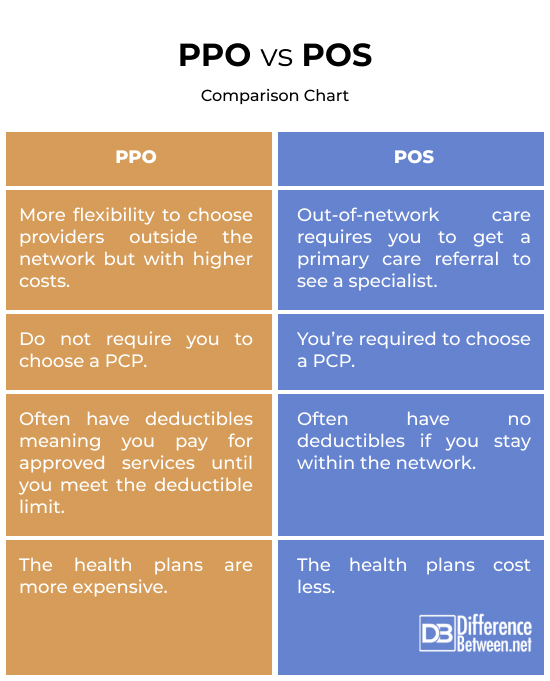Difference Between PPO and POS
Which health insurance plan is best for you? There are a few common managed health insurance plans you can choose from. We’re going to talk about two of them: PPO (Preferred Provider Organization) and POS (Point of Service). PPO plans are a bit flexible but more expensive than POS plans.
On the other hand, POS is essentially a combination of an HMO (Health Maintenance Organization) and a PPO. However, both PPO and POS plans aim to balance cost-effectiveness with flexibility.
But the question is: which one’s right for you? Let’s simplify it for you!

What is PPO?
PPOs are similar to service plans but with a smaller panel of service providers, sometimes substantially smaller. With PPO plans, you have more flexibility in which providers you see. You receive the best of benefits when you visit an in-network provider. On the other hand, the benefits are reduced if you seek care from a provider who is not in the PPO network.
PPO plans typically cover a portion of the costs for out-of-network care, but you’ll likely have higher co-payments, deductibles, and coinsurance. Although the plans cost less, they come with some restrictions.
PPO plans attract deductibles, meaning you have to pay for approved services until you meet the deductible limit. That’s when your plan starts sharing costs. The plans come with higher monthly premiums, which mean higher upfront costs.

What is POS?
A point-of-service (POS) health insurance plan combines features of both HMO and PPO plans. Similar to PPOs, you can choose your primary care provider (PCP) from within the plan’s network of providers. A PCP is your main medical provider and serves as a central point for managing and coordinating the individual’s healthcare.
Like PPOs, POS plans offer coverage for both in-network and out-of-network healthcare services. However, the costs associated with out-of-network care are usually higher, including higher deductibles, co-payments, and coinsurance.
Unlike some HMOs, POS plans allow you to seek emergency care from out-of-network providers without a referral, though at a higher cost. POS plans aren’t nearly as common as other health insurance plans. Only 1 in 10 employees with an employee-sponsored health plan have a POS plan.
Difference between PPO and POS
Flexibility
With PPO, you have more freedom to choose providers outside the network, and you don’t even need a referral to see a specialist. You can directly schedule an appointment with a specialist of your choosing. POS plans also allow out-of-network care, but you may need a primary care referral to see specialists or undergo certain medical procedures.
Deductibles
PPO plans often have deductibles, meaning you have to pay for approved services until you meet the deductible limit. That’s when your plan starts sharing costs. On the other hand, POS plans often have no deductible if you stay within the network and get referrals from your primary care physician for specialist visits.
Premiums
A PPO plan attracts higher monthly premiums, and higher premiums mean higher upfront costs. It seems the increased flexibility comes with a cost. POS plans may have lower premiums than PPOs because they have fewer options. POS plans usually cost less but have some restrictions on the health care providers you can visit.
PPO vs. POS: Comparison Chart

Summary
So, PPO plans are more expensive because you have more flexibility in choosing the providers. But the increased flexibility comes with a cost. You get the best benefits if you stay within the network, but you have to pay more out-of-pocket costs if you seek care from out-of-network providers. You can also visit a specialist without a referral.
POS plans, on the other hand, also cover both in-network and out-of-network care, but you need a referral to see a specialist. In-network care generally has lower out-of-pocket costs, but out-of-network care usually attracts higher deductibles, co-payments, and coinsurance.
FAQs
Is a POS the same as a PPO?
Although they share some similarities, POS plans are not the same as PPO plans.
What are the differences between HMO, PPO, EPO, and POS?
- HMO: Provides healthcare services through a network of doctors for a fixed monthly or annual fee. It limits coverage for out-of-network care.
- PPO: Provides flexibility to choose providers outside the network, but with a higher fee and deductible.
- EPO: An exclusive provider organization (EPO) is more restrictive, with less or no coverage for out-of-network care.
- POS: Combines features of both HMO and PPO plans. Out-of-network care requires a referral.
What is the difference between a PPO and an EPO?
Both offer more freedom, but PPOs allow out-of-network flexibility, while EPOs require you to stay within the network but typically have lower premiums than PPOs.
Why is a PPO plan better?
With a PPO plan, you can see a doctor or specialist of your choosing at any time without any referrals. You can receive care wherever you are.
Is POS a type of insurance?
Yes, POS is a type of health insurance plan. For more details, refer to the article.
What does PPO mean in billing?
A Pension Payment Order (PPO) is a unique 12-digit alphanumeric code assigned to every pensioner under the Employee Pension Scheme (EPS).
Is EPO or POS better?
EPO offers lower premiums but limited network access, while POS provides some out-of-network flexibility at a slightly higher cost. The choice is yours.
Why is EPO more expensive than PPO?
Actually, it’s the other way around. EPO plans are typically less expensive than PPOs.
- Difference Between Caucus and Primary - June 18, 2024
- Difference Between PPO and POS - May 30, 2024
- Difference Between RFID and NFC - May 28, 2024
Search DifferenceBetween.net :
References :
[0]Kongstvedt, Peter R. Health Insurance and Managed Care: What They are and How They Work. Jones & Bartlett Publishers, 2016.
[1]Kongstvedt, Peter R. Health Insurance and Managed Care: What They are and How They Work. Jones & Bartlett Publishers, 2016.
[2]Kongstvedt, Peter R. The Managed Health Care Handbook. Jones & Bartlett Publishers, 2001.
[3]Kongstvedt, Peter R. Essentials of Managed Health Care. Jones & Bartlett Publishers, 2003.
[4]Masterson, Les. “POS vs. PPO Plans: Simple Comparison.” Forbes, 20 Feb. 2024, www.forbes.com/advisor/health-insurance/ppo-vs-pos/.
[5]Image credit: https://www.canva.com/photos/MADer4pT8GM-ppo-vs-hmo-written-in-a-note-/
[6]Image credit: https://www.canva.com/photos/MAD_48afRUQ-point-of-service-plan-pos-is-shown-on-the-conceptual-business-photo/
